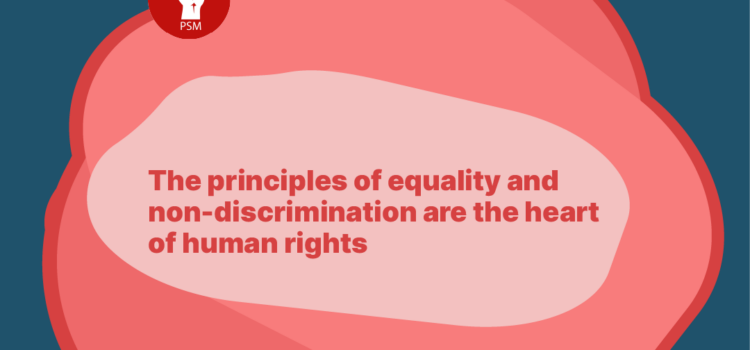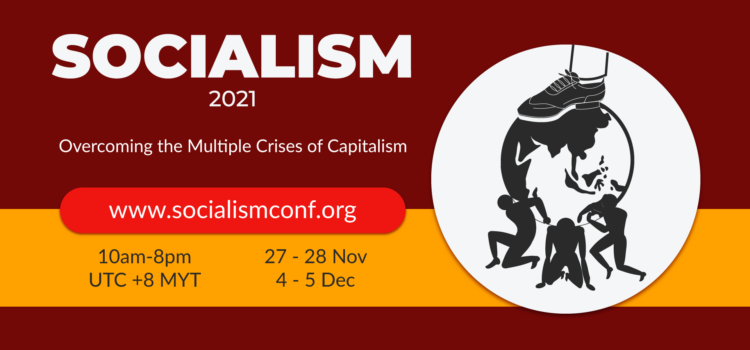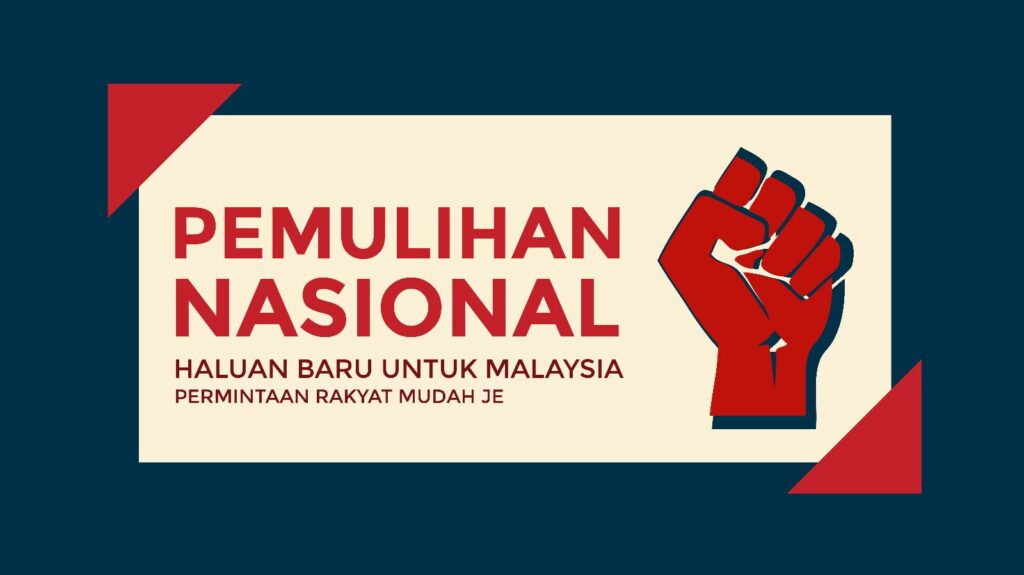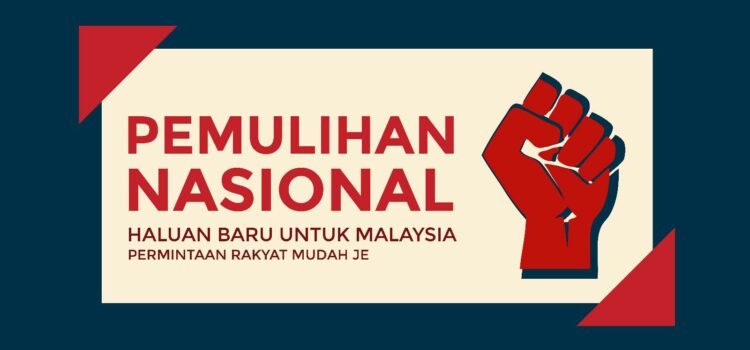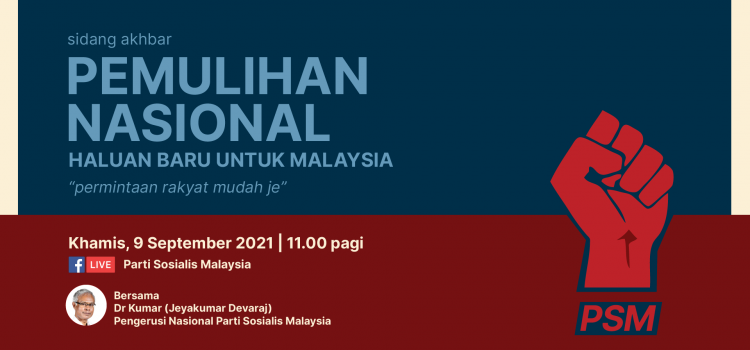PARTI SOSIALIS MALAYSIA – STATEMENT – 29TH SEPT 2021
The 12th Malaysia Plan (12MP) announced by the ‘interim’ Prime Minister Ismail Sabri last 27th September, 2021 is being heavily debated by both Parliamentarians and civil society organizations throughout this week. Reading through the executive summary and the some sections of the 500 over pages of the 12MP, you will be swamped by many words such as “Game Changers” and “Resetting the Economy”.
But I am still looking for the “game changing” policy that would make a revolutionary impact to the Malaysian economy in the document. While the aspirations of resetting the economy is welcomed, but the document fails to spell out in detail how the 12MP is different in comparison to the 11th Malaysia Plan and the plans before it. I would have expected that the lessons of Covid 19 would have ‘shook up’ the policy makers to take a closer look at reality and translate them into truly progressive programs that could have taken Malaysia into a different developmental path. But the 12MP falls short of providing real solutions.
PSM asserted in our alternative New Deal for Malaysia action plan called “Haluan Baru Untuk Malaysia Permintaan Rakyat Mudah Je” that was launched last 9th September, 2021 the key lessons that we learnt during the pandemic. Amongst those are;
- The Pandemic and its induced economic crisis, hits the B40 the hardest. Despite the undistinguishable attack of the virus amongst the rich and poor, but a household’s income and job security often determines if they can remain resilient throughout the pandemic.
- Jobs that were taught to be a secure could just vanish overnight and many were left to fend for themselves, struggling desperately to put food on the table. Without a comprehensive social security system, many fell through the cracks.
- We were always told to believe that the private sector is the key driver for economic progress that provides jobs for the rakyat. But when economic downturn strikes, private sector faltered and downsized their workforce and froze new job openings. Many projects were put on hold, an employment soared to 4.8% as at June, 2021(DOSM). The impact is larger as many have been forced from formal employment into underemployment and informal work.
- Although policy makers always pushed for more privatization of healthcare, health tourism and incentives for private medical care, but it has been blatantly proven that was the public healthcare system that provided care to the rakyat under the pandemic. Private healthcare was reluctant and moved extremely slow to relieve the load off government hospitals to take in Covid patients.
- Sectors of our working people often forgotten and marginalized by many were actually the ones holding up the nation in times of crises. Those that provided essential services such as farmers, cleaners, garbage collectors, lorry drivers, delivery riders played a critical role to keep the supply and services going. We realized that it was not the fund managers, the speculators, the stock marketers and the bourgeois elite that stood out in these trying times.
These hard lessons need to be understood and, acted upon, so that we don’t make the same mistakes again. These experiences have taught us that we cannot return to business as usual and need to seriously to revamp our economic and development model in order to make ourselves more resilient to future crises. Unfortunately these valuable lessons seem to have fallen on deaf ears in Putrajaya, as they ‘missed the boat’ to truly reset our trajectory post pandemic. Why do I say so?
- The 12MP is said to anchor on three themes, namely – resetting the economy, strengthening security, well-being and inclusivity and advancing sustainability. Its puzzles as to why 12MP places emphasize on security enhancement and lumps up the proposals together with issues that matter the most for the rakyat at the moment which is healthcare, housing and poverty eradication. Shouldn’t these rakyat centric issues be addressed in a stand-alone theme?
- The supposedly high impact sectors that are supposed to rejuvenate the economy are listed as Electronics & Electrical (E&E), Aerospace, Global Services, Creative Industries, Tourism, Halal Industry, smart farming and biomass. Besides E&E, of which Malaysia is a key player, do we really have the capacity and comparative advantage to excel in those fields?
Even though we excelled in electronics, as a result of MNC’s investing in Malaysia since the 1970’s, but are we expecting similar global players in aerospace, smart farming etc., to invest in Malaysia and transfer knowledge to us? After 64 years of independence, why do we place so much reliance on FDI to push our economy ahead? Furthermore with trade agreements like the CPTPP, it makes it harder to compel MNC’s to transfer technology to locals. (MITI is in process of ratifying the CPTPPA)
After the global pandemic, MNC’s and global corporations are reviewing their investment portfolios in view of the global economic downturn. In the race to the bottom to attract FDI, we will be forced to make concession by keeping our corporate taxes low and maintain cheap wage policies.
PSM proposed in our New Deal for Malaysia action plan that the government must look inwards to spur the economy by initiating projects that will benefit the rakyat directly. There is a great need to embark on projects like building more public housing. PSM proposed that each Parliament constituency need to be allocated such projects based on their constituent’s demography and demand. The government should also embark on green projects such as reforestation, cleaning of rivers and conservation activities to revive our local heritage. These might not be sophisticated initiatives but they are key to bring immediate benefits to the rakyat and our climate. We need to increase our medical research capacity in medicine and pharmacology. Such policies will not only spur the economy but will also provide jobs that are very much needed now in the situation where private sector slowed down on employment opportunities.
The society in need of government assistance requires large number of social welfare workers to provide direct assistance to them. Can we not employ our youth to service each constituency? Reaching out to them, so that the old and disabled are not forced to make their way to government counters to have their benefits processed.
- Micro and Small and Medium Enterprises (MSME) are envisioned to make a leap from being local to global market players. This is another supposedly “game change’ that is completely divorced from the realities on the ground. The pandemic has dreadfully caused the MSME to either closedown or retreat many-many step backwards since the outbreak. Does the government have data to reflect how many of these enterprises that have shutdown permanently? In a situation when they have taken a bad hit even locally how can one project themselves to be a global player anytime soon? Shouldn’t the government plan have a step by step plan to rebuild the MSME’s, holding their hands to uplift them instead of building castles in the sky!
The crisis has only served to concentrate capital in the hands of a few, as the large corporations survived and benefitted when smaller competitors closed down or were bought over. Without dissecting and understanding the true state of our businesses, the assistance and government induction programs under 12MP will not reach the target group.
To make matters worse, the decision that freight forwarding companies will be required to have a 51% Bumiputra ownership completely disrupt the business environment. Such race based policies that continue to haunt us, makes a joke out of the “Keluarga Malaysia” rhetoric proclaimed by PM Ismail Sabri. Is this a reflection on more race based policies to come from Putrajaya? To forcefully eat into non Bumiputra equity to enrich Bumiputra elite?
- As a part of the policy enablers that seek to develop future talent, 12MP aspires to increase our wage to GDP ratio from 37.2 % to 40%. But it explains that this can be achieved by only up skilling our workforce and increasing skilled manpower into high paying sectors. It fails to address the fact that irrespective of high skill jobs in high impact industries, wages are predominantly determined by labour supply and demand. That is why we witnessed reports of graduates being paid as low as RM1000 per month, when unemployment increased. Alternatively, government most significant intervention will be to strategically increase the minimum wage to truly reflect a living wage.
PSM is proposing that the minimum wage be raised to RM 1,800 per month from the current RM1, 200 per month. Even that is lower that the recently reviewed poverty line of RM 2200. With the increase in minimum wage it will gradually push upwards all other wage categories accordingly as we have seen when the minimum wage was introduced in 2012.
- 12MP projects to increase our Per Capita National Gross Income from RM42, 503 (2020) to RM57, 882 by the year 2025. But time again, many have pointed out that it is not the issue of productivity and wealth creation but rather its distribution. Department of Statistics and KRI calculations show that B20 Households only share 5.9% of the national household income while the Top 10% (T10) possess 30.7% of it. Thus even if we achieve the targeted per capita NGI of RM57, 882 in the year 2025, but what good it does if the disparity between the rich and the poor remains the same. While the immediate reaction to the argument would be that we need to increase productivity but how do we justify the disparity of more than 20 times in remuneration between the lowest rung of workers and the enterprises CEO? The government must be bold enough to introduce maximum wages in enterprises. But it can only have the moral authority to convince the private sector if it does the same with its own Minister’s salaries and GLC s top administrator’s pay packages.
- Amongst the policy initiatives suggested in 12MP, was to generate income to fund poverty eradication. It suggests introducing tax models like zakat or wakaf. PSM has advocated for a wealth tax and inheritance tax for a long time. Unfortunately, Putrajaya is unwilling to impose such taxes that will truly be ‘game changers’. Many renowned economists concurred with the idea that the wealthy should contribute more to revive the country out of the Covid19 induced economic crisis. Prof. Jeffrey Sachs, head of the Sustainable Development Solutions Network said that “We will need to tax high-net worth, especially after the current disaster,”
Wealth tax is a tax levied on the value of held assets where tax will be applicable to a variety of asset types including cash, bank deposits, shares, fixed assets, personal cars, assessed value of real property, pension plans, money funds, owner-occupied housing, and trusts. We propose this tax only on those that have a declared wealth of RM1 billion and above. It would be a progressive tax starting from 2% up top 10%.
It is calculated proportionately according to the tax bracket that they fall. For example a billionaire with an estimated net wealth worth of RM 4.34 billion, will pay only 2% for the first 2 billion and 4 % for the balance 2.34billion.
Thus if the government taxes the 50 wealthiest Malaysians progressively it will generate approximately RM 20 billion per year from the billionaires. Rest assured that, that no billionaire will be pushed to poverty if the tax system is introduced. With the global economic downturn due to the pandemic, the wealthy have limited avenues to invest in productive capital. Thus it payback time, as they and their business empires have enjoyed various governments business friendly incentives and tax holidays all these years.
- The way that 12MP addresses affordable housing problem is rather disappointing. While in the last few years, many researchers and civil society organizations have highlighted the severity of the problem and how to solve it, but 12MP offers no new ‘game changers’ here again.
To start with, the report agrees that the house affordable index has remained unaffordable with the median multiple affordability indexes has only decreased from 5.0 to 4.1 in 2019, which is still highly unaffordable to many Malaysians. But 12MP offers no new solutions and reiterates its previous plans to facilitate financing and reduce building cost. PSM has many times pointed out that the elephant in the room is the house price and speculative activities in the housing market. Price of homes for the poor can only be addressed if the government delinks public housing from market forces. The responsibility to provide houses for the poor relies on the government and not on any public-private partnerships. Public-private policy shifts made since the 1980’s had only exasperated the problem leading private house developers to dictate terms and prices of houses. While the affordability bracket for most B40 and M40 Malaysian is below RM 200, 000, but developers continue to price their property well above RM300, 000. Thus forcing the government to intervene and provide into the middle market for houses priced at RM200, 000. This has led the government to neglect its core responsibility of build low cost houses for the B40 and B20.
PSM propose that the government sets up a non-profit trust fund to build houses for the poor. It must be located near public transport hubs, so that working people can get to the cities without incurring much cost on transport. It just shocks me to see the 12MP actually proposing in page 4-24 that “Di samping itu, tanah milik syarikat utility awam yang sesuai akan dikenalpasti untuk membina rumah mampu milik, terutama dikawasan Bandar dan pinggir Bandar. Setakat ini, tiga loji rawatan kumbahan telah dikenalpasti untuk pembangunan tersebut”.
Is this Ismail Sabri’s plan to marginalize the poor by ghettoizing them into houses near sewerage tanks! This is despicable!
- I would have expected that public healthcare to be given prominence in the 12MP, since we witnessed the flaws and insufficiencies during the pandemic. But like I said earlier, healthcare is lumped together with security that seeks greater enforcement against migrants. Besides the reiterating on the existing PeKa B40 scheme, again there is no ‘game changer’ here to overcome the shortcomings of medical staff and facilities during that we are facing now to fight the pandemic. Even on the issue of contract doctors which saw doctors up in arms, the 12MP is silent in offering concrete solutions. It just states that there will be a plan formulated to address manpower and facility requirement.
It further talks about enhancing post graduate curriculum to increase the number of specialist doctors. However no targets are put forward in 12MP to prevent the brain drain from public to private hospitals. Where else, PSM in our New Deal plan proposed the following measures on reinforcing our public healthcare system;
- Setting up of a specific Public Health Service Commission to ensure effective management of staff in government Hospitals that will closely look into their grouses and benefits.
- Introduce a 3 month sabbatical study leave for doctors every 4 years in service so that they can specialize and upgrade their skills.
- A moratorium on new private hospitals, to stop the brain drain of specialist from government Hospitals to Private Hospitals.
- Increase 6 billion to the health budget every year for 5 years from now. The health budget in 2021 stands at 32 billion. This significant increase in allocation shows that we are serious to overcome the insufficiencies experienced fighting the pandemic and to build our capacity in preparation for another catastrophe in the future.
- Need to increase more Hospitals in the capital city of each state to accommodate the increase in population due to urbanization.
- Incorporate the 7000 over general practitioners to treat patients with chronic illness. GP’s can play a vital role as they are usually closely located to the patients and can offer close regular care to avoid patients dropping into a critical stage. Government can pay these GP’s capitation fee to look after a certain number of patients in their vicinity. These measures would greatly reduce the burden on government Hospitals.
- 90% of all surgical appliances such as screws and plates should be sponsored by the government. Over the years, this list of items that are subsidized for the rakyat has shrinked. Healthcare should be available to everyone and not determined by how deep ones pocket is.
- Levy collected from migrant workers should be used to pay for their medical cost. Now, many migrants fail to get appropriate care when their employers abscond thus leaving hospitals to burden the cost.
This proposal of PSM New Deal can be read further here: https://partisosialis.org/a-new-deal-for-malaysia-socialists-launch-progressive-recovery-plan/
The analysis on the other areas elaborated in the 12MP will be taken up in following articles. In conclusion, the question remains that where is the ‘game changer’ that will supposedly change the development path of Malaysia post Covid19. The pandemic offered an opportunity for policy makers to build Malaysia from ground zero, correcting past development and policy mis-steps, but unfortunately 12MP looks more of a continuation of past developmental trajectory.
Race and neoliberal based policies still predominate the plan. Malaysia’s recovery and progress requires a serious paradigm shift decoupling itself from race and neoliberal policies that have clearly failed to save guard the rakyat interest in times of crisis.
Thus the 12 MP, looking at the sections talked about above has failed to offer a real progressive way forward for rakyat whom are still struggling to crawl out of the adverse effects of the pandemic.
Sivarajan A.
Secretary General PSM
29/9/2021
